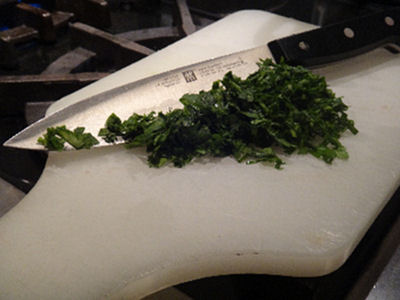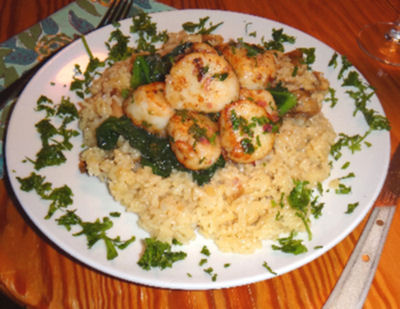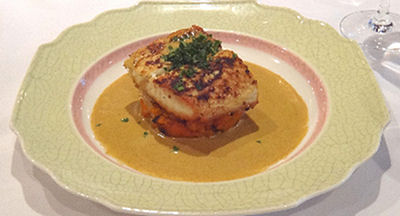
Good Cooking since 1995

Chopped Parsley
What's that green stuff?
more info:
Why do chefs sprinkle chopped parsley on the rim of the plate in
so many restaurants? Actually I'm surprised that this garnish is
still being used by many cooks and chefs, it's certainly not in
vogue now!
You can search the Internet and get a history
lesson on the use of parsley as a garnish for food. Going back to
the late 1800's butchers used sprigs to enhance the look of the cut
meat on display. Even today some do, but during the 1970's many
adopted Kale because it didn't wilt as fast and could even be used
for a few days in a row. Neither is terribly expensive but if you
total up the cost over a year, it may come to several hundred
dollars or more for large displays.
In restaurants too, this
kind of garnish was adopted. Perhaps it was the French or even the
English who garnished grilled meats, particularly lamb chops, with
sprigs of watercress. This was known as "Vert Pre" in French and
also included a grilled half of a tomato and shoestring French
fries, aka, Pommes Allumettes---matchstick potatoes---for a complete
garnish. Ah those French chefs, there are specific garnishes for
everything from grilled meats, to poached fish and even vegetables
and desserts. More on that another day!
In nice restaurants,
sprigs of parsley were "de rigueur"---a common garnish for all food
except desserts. Somewhere along the line there was an addition and
or change in how the parsley was used. To the back burner went the
sprigs and on the front burner was chopped parsley! But wait,
chopped parsley always existed in French cuisine it was part of many
preparations, after all parsley is an herb. A classic "Sauté
Meuniere" has lemon juice and chopped parsley added to browned
butter at the last minute and then it's poured over sautéed fish
that was just cooked previously in the same pan. This is only one
example. In the world of restaurants it was common to sprinkle
chopped parsley on everything from lasagna, to osso bucco or mashed
potatoes to spaetzle. Heck, my grandmother always had plants growing
from spring to fall and sprinkled chopped parsley on everything from
goulash to roast chicken or buttered noodles to chicken noodle soup.
It was and still is a great flavor enhancer and a quick garnish too!
I can vividly remember that she would carefully wipe the edge of the
plate clean with a damp cloth, if even a speck of parsley somehow
landed on the rim of the plate, just before serving it to the
family.
The practice of wiping the edges of a plate is well
known to many chefs who understand clean presentations: that is, a
plate of food served with no sauce drips, spattered grease or
anything else on the rim of a plate. I totally adhere to this
standard, even doing it at home and have also wiped the edge of a
plate in a restaurant, because I couldn't stand for a drip of gravy
on my plate!!! You can guess what I think of chopped parsley or even
a dusting of spices as a rim garnish---sloppy at best!
The
practice began in the early 1980's. I believe it was first
introduced somewhere in California during the days of Spa Cuisine.
Spa Cuisine was the precursor of healthy eating; you know what you
shouldn't eat---cream, butter, cheese and certainly no bacon or
steak. It was all the rage with Chefs worldwide coming up with
healthy alternatives for their customers to enjoy. I did it myself
and introduced "Fitness Cuisine" to the Ritz-Carlton.
Parsley is very good for you and thus incorporating it into a
healthy dish made it even healthier. Not only was it sprinkled on
the food but now on the rim of the plate, but what isn't known is
that it wasn't just parsley back then. Petals of nasturtiums,
pansies, sage blossoms, chopped chives and other fresh herbs were
used to make the rim look pretty and healthy---it worked and this
practice spread from coast to coast and was even adopted by European
chefs. It looked great but it was very expensive, fresh herbs and
edible flowers are very perishable as well as expensive. So some
chefs had to cut back and they found that a sprinkling of just
chopped parsley worked too, especially if a bit of paprika or fennel
pollen was added to the mix.
So from the 1980's to 2000's,
this fad remained entrenched in many a chef's garnishing repertoire.
Not me though, never once have I sprinkled chopped parsley on a
plate rim, but I have used the edible flower and fresh herb
concoction a few times for special occasions. I'm a shadow of my
grandmother, and other professional chefs who like clean rims of
plates, no drips and heaven forbid, a fingerprint or a spatter of
fat!
Chefs these days have moved on to other visual
enhancements or none at all and to my pleasure, more wiped clean
rims of plates. But not all chefs have evolved past the trend. I see
the use of chopped parsley on the rim of a plate in many sports
bars, large chain restaurants and in many American Italian eateries.
One of the finest restaurants in New Orleans still does it, a great
Tex-Mex restaurant in Houston, a bar and grill in Key West and a
good pizza restaurant in Boston! They are not alone; I suspect
thousands of chefs still do too. I see this on the Internet at sites
where food pictures are posted all the time. Perhaps it's a lack of
training, maybe laziness, not caring or not knowing about other ways
to make food look good?
Necessary or not---that is the
question. It worked for 20 years, but was just a food trend and food
is trendy to some---it looked cute to some diners? I really, really
think it is a time for change and hope that this article will be a
point of reference for all chefs who still sprinkle chopped parsley
on the rims of their plates, to stop and go back to the future.
Don't do like the chef next door, get creative and rethink how you
can garnish your plates. Go for the clean look and save the bunch of
parsley from being chopped. Save money and it will be less work each
day too!
See for yourself; the two pictures illustrate what
I'm talking about. The one on the left with chopped parsley scattered about and
and the right with none and in my opinion, and looking good!

Sea Scallops Saute Meuniere with Mushroom Pilaf

Butter Crumb Roasted Halibut with Sauce Nantua